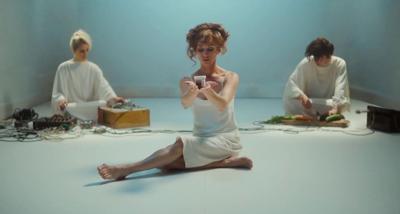The kind of film that if nothing else will help you understand your friends who were in noise bands just a little better, Flux Gourmet is a sensual masterpiece that would cause a riot in most legislative bodies. It’s a singular expression of unspeakable corners of the human condition, and the kind of film that, if it were a person, you’d want to take out and make your friends … concerned. Back in my festival-programmer days, the perennial operating procedure was this: Any film that made me laugh or scream at a volume or intensity that got the neighbors texting, calling or knocking at the door in concern was automatically accepted. Flux Gourmet elicited a fit of laughter that set off the neighbor’s dogs across the yard, which is an unprecedented phenomenon.
But writer-director Peter Strickland’s films are nothing if not singular provocations. 2012’s Berberian Sound Studio detailed the mental fractalization of a Foley artist going mad, 2014’s The Duke of Burgundy was an exquisite feminist tale of BDSM with a credited “fragrance consultant,” and 2018’s In Fabric was a masterpiece of lowbrow and highbrow getting all torn up and making something amazing. Strickland delights in all the senses, even the ones typically ignored by cinema. This is a film that literally takes the phrase “artsy-fartsy” and explores it from both angles, giving the artistry and the fartistry equal footing in the insane world it unfolds in.
In this film, performance artists working in the milieu of “sonic catering” (musical cooking) have taken up a three-week residence at the behest of Jan Stevens (Gwendoline Christie). Perfectly attired, Stevens is equal parts patroness, minister of culture, festival programmer, arts doyenne, executive director and velvet-clad fist of iron when it comes to the world of avant-garde art. Kohl-rimmed eyes and constructively expressive hats are but part of this woman’s arsenal, and the trio she has brought to her country manse are indeed a wild bunch of spiky freaks. Sometimes, you see, one of the greatest gifts one can give an artist is to tell them no.
Elle (Fatma Mohamed) is the creative force — Diamanda Galás and Karen Finley at the same time. Her jewelry and accessory game are impeccable, and her fingerless cat-burglar gloves are never not funny — up there with Bellini’s double-towel reveal in the new season of The Kids in the Hall. Mohamed gave one of the best performances of 2018 in In Fabric, and here she flourishes, tearing into this film like a bird of prey. “Wouldn’t it be easier to compromise,” the writer-documentarian Stones asks her. “No,” she replies, cigarette smoke wafting behind her, puffy sleeves punching through a diffident world.
And Stones (Makis Papadimitriou), an adorable bean-bag chair of a man, is betrayed by his own digestive system to the extent that he lives in fear of being exposed for his near-continuous stream of flatulence. His stasis is pitched in opposition to Elle’s full-speed-ahead mood swings, establishing the continuum the film’s characters will be conducting themselves on. There’s also Billy (Asa Butterfield), styled like he’s the cover model for Sullen Teen magazine, and Lamina (Ariane Labed as Kristen Stewart, crafting the only character to inspire both empathy and the outright coveting of outfits), the technicians Elle depends on and devours (metaphorically) to bring her visions to life. Over the course of three weeks, as artists are wont to do, boundaries will be transgressed, grants will be accessed, and formal dining will never be the same again. “Misunderstandings between us,” Billy confesses, “are the key to our sound.”
The film explores compulsive farting and the collective’s response to it as a metaphor for the way that contemporary art and culture metabolize and exploit trauma and pain, and that’s not going to appeal to everyone. Or even most people. But Strickland and his cast understand the labyrinthine world of endowment funding and patronage that prop up what little investment in the arts is available these days, and in its fantastic burlesques and dips into the truly grotesque (the influence of The Kipper Kids is never completely beyond us as a culture) they find some stark truth that more accessible cinema would only tiptoe around. This is a film in which The Mangrove Snacks — a collective Jan Stevens rejected for residence — periodically emerges to wage terrapin-based terrorist attacks against the institution. (“They don’t even do transgression well,” Jan deadpans.) Every performance concludes with “audience tributes,” which are basically exquisitely photographed, Radley Metzger-style orgies between artist and audience.
There’s a moment, fairly early on, when Elle gives her after-dinner speech, deconstructing the idea of the manufactured housewife. She says, “Time spent cooking is time in which you can dream about the things you want out of life, even if they might not be possible,” and it hits you in the solar plexus like a fire extinguisher. Every gesture in this film means something more than just what it depicts, a feast of nested possibilities that resonate even after Flux Gourmet ends. One of the highest compliments a film can receive is that just by watching and listening to it, you learn all sorts of things you never even thought about exploring. If a film is a meal, Flux Gourmet is Noma and El Bulli territory, the earthy drive of hunger fulfilled in the realm of the sublime.





